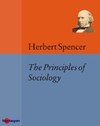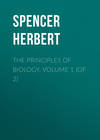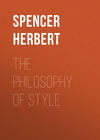Читать книгу: «The Data of Ethics»
AUTHOR'S PREFACE
A reference to the programme of the "System of Synthetic Philosophy" will show that the chapters herewith issued constitute the first division of the work on the Principles of Morality, with which the System ends. As the second and third volumes of the Principles of Sociology are as yet unpublished, this installment of the succeeding work appears out of its place.
I have been led thus to deviate from the order originally set down by the fear that persistence in conforming to it might result in leaving the final work of the series unexecuted. Hints, repeated of late years with increasing frequency and distinctness, have shown me that health may permanently fail, even if life does not end, before I reach the last part of the task I have marked out for myself. This last part of the task it is to which I regard all the preceding parts as subsidiary. Written as far back as 1842, my first essay, consisting of letters on The Proper Sphere of Government, vaguely indicated what I conceived to be certain general principles of right and wrong in political conduct, and from that time onward my ultimate purpose, lying behind all proximate purposes, has been that of finding for the principles of right and wrong, in conduct at large, a scientific basis. To leave this purpose unfulfilled, after making so extensive a preparation for fulfilling it, would be a failure the probability of which I do not like to contemplate, and I am anxious to preclude it, if not wholly, still partially. Hence the step I now take. Though this first division of the work terminating the Synthetic Philosophy, cannot, of course, contain the specific conclusions to be set forth in the entire work, yet it implies them in such wise that, definitely to formulate them requires nothing beyond logical deduction.
I am the more anxious to indicate in outline, if I cannot complete, this final work, because the establishment of rules of right conduct on a scientific basis is a pressing need. Now, that moral injunctions are losing the authority given by their supposed sacred origin, the secularization of morals is becoming imperative. Few things can happen more disastrous than the decay and death of a regulative system no longer fit, before another and fitter regulative system has grown up to replace it. Most of those who reject the current creed appear to assume that the controlling agency furnished by it may safely be thrown aside, and the vacancy left unfilled by any other controlling agency. Meanwhile, those who defend the current creed allege that in the absence of the guidance it yields, no guidance can exist: divine commandments they think the only possible guides. Thus, between these extreme opponents, there is a certain community. The one holds that the gap left by disappearance of the code of supernatural ethics need not be filled by a code of natural ethics, and the other holds that it cannot be so filled. Both contemplate a vacuum, which the one wishes and the other fears. As the change which promises or threatens to bring about this state, desired or dreaded, is rapidly progressing, those who believe that the vacuum can be filled, and that it must be filled, are called on to do something in pursuance of their belief.
To this more special reason I may add a more general reason. Great mischief has been done by the repellent aspect habitually given to moral rule by its expositors, and immense benefits are to be anticipated from presenting moral rule under that attractive aspect which it has when undistorted by superstition and asceticism. If a father, sternly enforcing numerous commands, some needful and some needless, adds to his severe control a behavior wholly unsympathetic; if his children have to take their pleasures by stealth, or, when timidly looking up from their play, ever meet a cold glance or more frequently a frown, his government will inevitably be disliked, if not hated, and the aim will be to evade it as much as possible. Contrariwise, a father who, equally firm in maintaining restraints needful for the well-being of his children or the well-being of other persons, not only avoids needless restraints, but, giving his sanction to all legitimate gratifications and providing the means for them, looks on at their gambols with an approving smile, can scarcely fail to gain an influence which, no less efficient for the time being, will also be permanently efficient. The controls of such two fathers symbolize the controls of Morality as it is and Morality as it should be.
Nor does mischief result only from this undue severity of the ethical doctrine bequeathed us by the harsh past. Further mischief results from the impracticability of its ideal. In violent reaction against the utter selfishness of life as carried on in barbarous societies, it has insisted on a life utterly unselfish. But just as the rampant egoism of a brutal militancy was not to be remedied by attempts at the absolute subjection of the ego in convents and monasteries, so neither is the misconduct of ordinary humanity, as now existing, to be remedied by upholding a standard of abnegation beyond human achievement. Rather the effect is to produce a despairing abandonment of all attempts at a higher life. And not only does an effort to achieve the impossible end in this way, but it simultaneously discredits the possible. By association with rules that cannot be obeyed, rules that can be obeyed lose their authority.
Much adverse comment will, I doubt not, be passed on the theory of right conduct which the following pages shadow forth. Critics of a certain class, far from rejoicing that ethical principles otherwise derived by them, coincide with ethical principles scientifically derived, are offended by the coincidence. Instead of recognizing essential likeness they enlarge on superficial difference. Since the days of persecution, a curious change has taken place in the behavior of so-called orthodoxy toward so-called heterodoxy. The time was when a heretic, forced by torture to recant, satisfied authority by external conformity: apparent agreement sufficed, however profound continued to be the real disagreement. But now that the heretic can no longer be coerced into professing the ordinary belief, his belief is made to appear as much opposed to the ordinary as possible. Does he diverge from established theological dogma? Then he shall be an atheist; however inadmissible he considers the term. Does he think spiritualistic interpretations of phenomena not valid? Then he shall be classed as a materialist; indignantly though he repudiates the name. And in like manner, what differences exist between natural morality and supernatural morality, it has become the policy to exaggerate into fundamental antagonisms. In pursuance of this policy, there will probably be singled out for reprobation from this volume, doctrines which, taken by themselves, may readily be made to seem utterly wrong. With a view to clearness, I have treated separately some correlative aspects of conduct, drawing conclusions either of which becomes untrue if divorced from the other; and have thus given abundant opportunity for misrepresentation.
The relations of this work to works preceding it in the series are such as to involve frequent reference. Containing, as it does, the outcome of principles set forth in each of them, I have found it impracticable to dispense with re-statements of those principles. Further, the presentation of them in their relations to different ethical theories, has made it needful, in every case, briefly to remind the reader what they are, and how they are derived. Hence an amount of repetition which to some will probably appear tedious. I do not, however, much regret this almost unavoidable result; for only by varied iteration can alien conceptions be forced on reluctant minds.
June, 1879.
CHAPTER I.
CONDUCT IN GENERAL
§ 1. The doctrine that correlatives imply one another – that a father cannot be thought of without thinking of a child, and that there can be no consciousness of superior without a consciousness of inferior – has for one of its common examples the necessary connection between the conceptions of whole and part. Beyond the primary truth that no idea of a whole can be framed without a nascent idea of parts constituting it, and that no idea of a part can be framed without a nascent idea of some whole to which it belongs, there is the secondary truth that there can be no correct idea of a part without a correct idea of the correlative whole. There are several ways in which inadequate knowledge of the one involves inadequate knowledge of the other.
If the part is conceived without any reference to the whole, it becomes itself a whole – an independent entity; and its relations to existence in general are misapprehended. Further, the size of the part as compared with the size of the whole must be misapprehended unless the whole is not only recognized as including it, but is figured in its total extent. And again, the position which the part occupies in relation to other parts, cannot be rightly conceived unless there is some conception of the whole in its distribution as well as in its amount.
Still more when part and whole, instead of being statically related only, are dynamically related, must there be a general understanding of the whole before the part can be understood. By a savage who has never seen a vehicle, no idea can be formed of the use and action of a wheel. To the unsymmetrically-pierced disk of an eccentric, no place or purpose can be ascribed by a rustic unacquainted with machinery. Even a mechanician, if he has never looked into a piano, will, if shown a damper, be unable to conceive its function or relative value.
Most of all, however, where the whole is organic, does complete comprehension of a part imply extensive comprehension of the whole. Suppose a being ignorant of the human body to find a detached arm. If not misconceived by him as a supposed whole, instead of being conceived as a part, still its relations to other parts, and its structure, would be wholly inexplicable. Admitting that the co-operation of its bones and muscles might be divined, yet no thought could be framed of the share taken by the arm in the actions of the unknown whole it belonged to; nor could any interpretation be put upon the nerves and vessels ramifying through it, which severally refer to certain central organs. A theory of the structure of the arm implies a theory of the structure of the body at large.
And this truth holds not of material aggregates only, but of immaterial aggregates – aggregated motions, deeds, thoughts, words. The moon's movements cannot be fully interpreted without taking into account the movements of the Solar System at large. The process of loading a gun is meaningless until the subsequent actions performed with the gun are known. A fragment of a sentence, if not unintelligible, is wrongly interpreted in the absence of the remainder. Cut off its beginning and end, and the rest of a demonstration proves nothing. Evidence given by a plaintiff often misleads until the evidence which the defendant produces is joined with it.
§ 2. Conduct is a whole; and, in a sense, it is an organic whole – an aggregate of inter-dependent actions performed by an organism. That division or aspect of conduct with which Ethics deals, is a part of this organic whole – a part having its components inextricably bound up with the rest. As currently conceived, stirring the fire, or reading a newspaper, or eating a meal, are acts with which Morality has no concern. Opening the window to air the room, putting on an overcoat when the weather is cold, are thought of as having no ethical significance. These, however, are all portions of conduct. The behavior we call good and the behavior we call bad, are included, along with the behavior we call indifferent, under the conception of behavior at large. The whole of which Ethics forms a part, is the whole constituted by the theory of conduct in general; and this whole must be understood before the part can be understood. Let us consider this proposition more closely.
And first, how shall we define conduct? It is not co-extensive with the aggregate of actions, though it is nearly so. Such actions as those of an epileptic in a fit are not included in our conception of conduct: the conception excludes purposeless actions. And in recognizing this exclusion, we simultaneously recognize all that is included. The definition of conduct which emerges is either acts adjusted to ends, or else the adjustment of acts to ends, according as we contemplate the formed body of acts, or think of the form alone. And conduct in its full acceptation must be taken as comprehending all adjustments of acts to ends, from the simplest to the most complex, whatever their special natures and whether considered separately or in their totality.
Conduct in general being thus distinguished from the somewhat larger whole constituted by actions in general, let us next ask what distinction is habitually made between the conduct on which ethical judgments are passed and the remainder of conduct. As already said, a large part of ordinary conduct is indifferent. Shall I walk to the waterfall to-day? or shall I ramble along the sea-shore? Here the ends are ethically indifferent. If I go to the waterfall, shall I go over the moor or take the path through the wood? Here the means are ethically indifferent. And from hour to hour most of the things we do are not to be judged as either good or bad in respect of either ends or means.
No less clear is it that the transition from indifferent acts to acts which are good or bad is gradual. If a friend who is with me has explored the sea-shore, but has not seen the waterfall, the choice of one or other end is no longer ethically indifferent. And if, the waterfall being fixed on as our goal, the way over the moor is too long for his strength, while the shorter way through the wood is not, the choice of means is no longer ethically indifferent. Again, if a probable result of making the one excursion rather than the other, is that I shall not be back in time to keep an appointment, or if taking the longer route entails this risk while taking the shorter does not, the decision in favor of one or other end or means acquires in another way an ethical character; and if the appointment is one of some importance, or one of great importance, or one of life-and-death importance, to self or others, the ethical character becomes pronounced. These instances will sufficiently suggest the truth that conduct with which Morality is not concerned, passes into conduct which is moral or immoral, by small degrees and in countless ways.
But the conduct that has to be conceived scientifically before we can scientifically conceive those modes of conduct which are the objects of ethical judgments, is a conduct immensely wider in range than that just indicated. Complete comprehension of conduct is not to be obtained by contemplating the conduct of human beings only; we have to regard this as a part of universal conduct – conduct as exhibited by all living creatures. For evidently this comes within our definition – acts adjusted to ends. The conduct of the higher animals as compared with that of man, and the conduct of the lower animals as compared with that of the higher, mainly differ in this, that the adjustments of acts to ends are relatively simple and relatively incomplete. And as in other cases, so in this case, we must interpret the more developed by the less developed. Just as, fully to understand the part of conduct which Ethics deals with, we must study human conduct as a whole; so, fully to understand human conduct as a whole, we must study it as a part of that larger whole constituted by the conduct of animate beings in general.
Nor is even this whole conceived with the needful fullness, so long as we think only of the conduct at present displayed around us. We have to include in our conception the less-developed conduct out of which this has arisen in course of time. We have to regard the conduct now shown us by creatures of all orders, as an outcome of the conduct which has brought life of every kind to its present height. And this is tantamount to saying that our preparatory step must be to study the evolution of conduct.
CHAPTER II.
THE EVOLUTION OF CONDUCT
§ 3. We have become quite familiar with the idea of an evolution of structures throughout the ascending types of animals. To a considerable degree we have become familiar with the thought that an evolution of functions has gone on pari passu with the evolution of structures. Now, advancing a step, we have to frame a conception of the evolution of conduct, as correlated with this evolution of structures and functions.
These three subjects are to be definitely distinguished. Obviously the facts comparative morphology sets forth, form a whole which, though it cannot be treated in general or in detail without taking into account facts belonging to comparative physiology, is essentially independent. No less clear is it that we may devote our attention exclusively to that progressive differentiation of functions, and combination of functions, which accompanies the development of structures – may say no more about the characters and connections of organs than is implied in describing their separate and joint actions. And the subject of conduct lies outside the subject of functions, if not as far as this lies outside the subject of structures, still, far enough to make it substantially separate. For those functions which are already variously compounded to achieve what we regard as single bodily acts, are endlessly recompounded to achieve that co-ordination of bodily acts which is known as conduct.
We are concerned with functions in the true sense, while we think of them as processes carried on within the body; and, without exceeding the limits of physiology, we may treat of their adjusted combinations, so long as these are regarded as parts of the vital consensus. If we observe how the lungs aërate the blood which the heart sends to them; how heart and lungs together supply aërated blood to the stomach, and so enable it to do its work; how these co-operate with sundry secreting and excreting glands to further digestion and to remove waste matter; and how all of them join to keep the brain in a fit condition for carrying on those actions which indirectly conduce to maintenance of the life at large; we are dealing with functions. Even when considering how parts that act directly on the environment – legs, arms, wings – perform their duties, we are still concerned with functions in that aspect of them constituting physiology, so long as we restrict our attention to internal processes, and to internal combinations of them.
But we enter on the subject of conduct when we begin to study such combinations among the actions of sensory and motor organs as are externally manifested. Suppose that instead of observing those contractions of muscles by which the optic axes are converged and the foci of the eyes adjusted (which is a portion of physiology), and that instead of observing the co-operation of other nerves, muscles and bones, by which a hand is moved to a particular place and the fingers closed (which is also a portion of physiology), we observe a weapon being seized by a hand under guidance of the eyes. We now pass from the thought of combined internal functions to the thought of combined external motions. Doubtless, if we could trace the cerebral processes which accompany these, we should find an inner physiological co-ordination corresponding with the outer co-ordination of actions. But this admission is consistent with the assertion, that when we ignore the internal combination and attend only to the external combination, we pass from a portion of physiology to a portion of conduct. For though it may be objected that the external combination instanced is too simple to be rightly included under the name conduct, yet a moment's thought shows that it is joined with what we call conduct by insensible gradations. Suppose the weapon seized is used to ward off a blow. Suppose a counter-blow is given. Suppose the aggressor runs and is chased. Suppose there comes a struggle and a handing him over to the police. Suppose there follow the many and varied acts constituting a prosecution. Obviously the initial adjustment of an act to an end, inseparable from the rest, must be included with them under the same general head; and obviously from this initial simple adjustment, having intrinsically no moral character, we pass by degrees to the most complex adjustments and to those on which moral judgments are passed.
Hence, excluding all internal co-ordinations, our subject here is the aggregate of all external co-ordinations; and this aggregate includes not only the simplest as well as the most complex performed by human beings, but also those performed by all inferior beings considered as less or more evolved.
§ 4. Already the question: What constitutes advance in the evolution of conduct, as we trace it up from the lowest types of living creatures to the highest? has been answered by implication. A few examples will now bring the answer into conspicuous relief.
We saw that conduct is distinguished from the totality of actions by excluding purposeless actions; but during evolution this distinction arises by degrees. In the very lowest creatures most of the movements from moment to moment made, have not more recognizable aims than have the struggles of an epileptic. An infusorium swims randomly about, determined in its course not by a perceived object to be pursued or escaped, but, apparently, by varying stimuli in its medium; and its acts, unadjusted in any appreciable way to ends, lead it now into contact with some nutritive substance which it absorbs, and now into the neighborhood of some creature by which it is swallowed and digested. Lacking those developed senses and motor powers which higher animals possess, ninety-nine in the hundred of these minute animals, severally living for but a few hours, disappear either by innutrition or by destruction. The conduct is constituted of actions so little adjusted to ends, that life continues only as long as the accidents of the environment are favorable. But when, among aquatic creatures, we observe one which, though still low in type, is much higher than the infusorium – say a rotifer – we see how, along with larger size, more developed structures, and greater power of combining functions, there goes an advance in conduct. We see how by its whirling cilia it sucks in as food these small animals moving around; how by its prehensile tail it fixes itself to some fit object; how by withdrawing its outer organs and contracting its body, it preserves itself from this or that injury from time to time threatened; and how thus, by better adjusting its own actions, it becomes less dependent on the actions going on around, and so preserves itself for a longer period.
A superior sub-kingdom, as the Mollusca, still better exemplifies this contrast. When we compare a low mollusc, such as a floating ascidian, with a high mollusc, such as a cephalopod, we are again shown that greater organic evolution is accompanied by more evolved conduct. At the mercy of every marine creature large enough to swallow it, and drifted about by currents which may chance to keep it at sea, or may chance to leave it fatally stranded, the ascidian displays but little adjustment of acts to ends in comparison with the cephalopod; which, now crawling over the beach, now exploring the rocky crevices, now swimming through the open water, now darting after a fish, now hiding itself from some larger animal in a cloud of ink, and using its suckered arms at one time for anchoring itself and at another for holding fast its prey; selects and combines and proportions its movements from minute to minute, so as to evade dangers which threaten, while utilizing chances of food which offer: so showing us varied activities which, in achieving special ends, achieve the general end of securing continuance of the activities.
Among vertebrate animals we similarly trace up, along with advance in structures and functions, this advance in conduct. A fish roaming about at hazard in search of something to eat, able to detect it by smell or sight only within short distances, and now and again rushing away in alarm on the approach of a bigger fish, makes adjustments of acts to ends that are relatively few and simple in their kinds; and shows us, as a consequence, how small is the average duration of life. So few survive to maturity that, to make up for destruction of unhatched young and small fry and half-grown individuals, a million ova have to be spawned by a cod-fish that two may reach the spawning age. Conversely, by a highly-evolved mammal, such as an elephant, those general actions performed in common with the fish are far better adjusted to their ends. By sight as well, probably, as by odor, it detects food at relatively great distances; and when, at intervals, there arises a need for escape, relatively great speed is attained. But the chief difference arises from the addition of new sets of adjustments. We have combined actions which facilitate nutrition – the breaking off of succulent and fruit-bearing branches, the selecting of edible growths throughout a comparatively wide reach; and, in case of danger, safety can be achieved not by flight only, but, if necessary, by defence or attack: bringing into combined use tusks, trunk and ponderous feet. Further, we see various subsidiary acts adjusted to subsidiary ends – now the going into a river for coolness, and using the trunk as a means of projecting water over the body; now the employment of a bough for sweeping away flies from the back; now the making of signal sounds to alarm the herd, and adapting the actions to such sounds when made by others. Evidently, the effect of this more highly-evolved conduct is to secure the balance of the organic actions throughout far longer periods.
And now, on studying the doings of the highest of mammals, mankind, we not only find that the adjustments of acts to ends are both more numerous and better than among lower mammals, but we find the same thing on comparing the doings of higher races of men with those of lower races. If we take any one of the major ends achieved, we see greater completeness of achievement by civilized than by savage; and we also see an achievement of relatively numerous minor ends subserving major ends. Is it in nutrition? The food is obtained more regularly in response to appetite; it is far higher in quality; it is free from dirt; it is greater in variety; it is better prepared. Is it in warmth? The characters of the fabrics and forms of the articles used for clothing, and the adaptations of them to requirements from day to day and hour to hour, are much superior. Is it in dwellings? Between the shelter of boughs and grass which the lowest savage builds, and the mansion of the civilized man, the contrast in aspect is not more extreme than is the contrast in number and efficiency of the adjustments of acts to ends betrayed in their respective constructions. And when with the ordinary activities of the savage we compare the ordinary civilized activities – as the business of the trader, which involves multiplied and complex transactions extending over long periods, or as professional avocations, prepared for by elaborate studies, and daily carried on in endlessly varied forms, or as political discussions and agitations, directed now to the carrying of this measure and now to the defeating of that – we see sets of adjustments of acts to ends, not only immensely exceeding those seen among lower races of men in variety and intricacy, but sets to which lower races of men present nothing analogous. And along with this greater elaboration of life produced by the pursuit of more numerous ends, there goes that increased duration of life which constitutes the supreme end.
And here is suggested the need for supplementing this conception of evolving conduct. For besides being an improving adjustment of acts to ends, such as furthers prolongation of life, it is such as furthers increased amount of life. Reconsideration of the examples above given will show that length of life is not by itself a measure of evolution of conduct; but that quantity of life must be taken into account. An oyster, adapted by its structure to the diffused food contained in the water it draws in, and shielded by its shell from nearly all dangers, may live longer than a cuttle-fish, which has such superior powers of dealing with numerous contingencies; but then, the sum of vital activities during any given interval is far less in the oyster than in the cuttle-fish. So a worm, ordinarily sheltered from most enemies by the earth it burrows through, which also supplies a sufficiency of its poor food, may have greater longevity than many of its annulose relatives, the insects; but one of these during its existence as larva and imago, may experience a greater quantity of the changes which constitute life. Nor is it otherwise when we compare the more evolved with the less evolved among mankind. The difference between the average lengths of the lives of savage and civilized is no true measure of the difference between the totalities of their two lives, considered as aggregates of thought, feeling and action. Hence, estimating life by multiplying its length into its breadth, we must say that the augmentation of it which accompanies evolution of conduct, results from increase of both factors. The more multiplied and varied adjustments of acts to ends, by which the more developed creature from hour to hour fulfills more numerous requirements, severally add to the activities that are carried on abreast, and severally help to make greater the period through which such simultaneous activities endure. Each further evolution of conduct widens the aggregate of actions while conducing to elongation of it.
Покупайте книги и получайте бонусы в Литрес, Читай-городе и Буквоеде.
Участвовать в бонусной программе




















